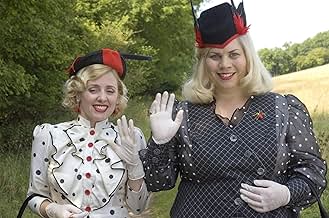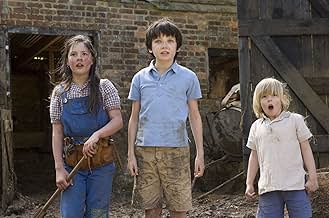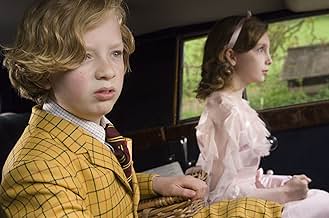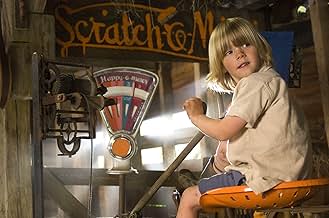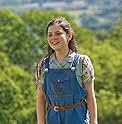Nanny McPhee arrives to help a harried young mother who is trying to run the family farm while her husband is away at war, though she uses her magic to teach the woman's children and their t... Read allNanny McPhee arrives to help a harried young mother who is trying to run the family farm while her husband is away at war, though she uses her magic to teach the woman's children and their two spoiled cousins five new lessons.Nanny McPhee arrives to help a harried young mother who is trying to run the family farm while her husband is away at war, though she uses her magic to teach the woman's children and their two spoiled cousins five new lessons.
- Director
- Writers
- Stars
- Awards
- 1 win & 2 nominations total
- Cyril Gray
- (as Eros Vlahos)
- Director
- Writers
- All cast & crew
- Production, box office & more at IMDbPro
Featured reviews
"Nanny McPhee and the Big Bang" has a simple plot that is accessible to both children and adults. The abundance of children and their misbehavior in the film should entertain and resonate with children. Nanny McPhee's mysterious ways of handling children is only limited by imagination, and also provide morality education in an engaging and fun manner. I find the ending rather touching, even though such an ending is expected as "Nanny McPhee and the Big Bang" is a children's film. It's a lovely fantasy tale for younger children.
The lovely Mrs Green (a perfectly charming Maggie Gyllenhaal) becomes burdened with looking after the family estate, a farm in the English countryside, and her sister's children (Eros Vlahos and Rosie Taylor-Ritson) as well as her own (Asa Butterfield, Oscar Steer and Lil Woods) when her husband (a wordless yet productive Ewan McGregor) goes to war.
The children take advantage of her current frenzied state by squabbling, playing dangerously, making a mess of the house and just generally misbehaving. There is also her scheming brother-in-law Phil (Rhys Ifans at his erratic, despicable, scraggly best) seizing opportunities to prise the ownership of the farm out of her hands, and into those of two ghastly female brutes (a spine-tingling pair of Katy Brand and Sinead Matthews actually evoke sympathy for the villainous Phil) who are relentlessly terrorising him.
To add to her stress, her elderly employer Mrs Docherty (a delightfully senile Maggie Smith) cannot be left alone in her own shop, for fear of disaster.
These are all perfect conditions for the snag-toothed hag with that distinctive silhouette to walk into, and she does just as things are at their most chaotic.
There is no doubt that the cast are superb, and the undisputed highlight of the whole picture. Thompson's reprisal of the role is a joy to behold, with all of the wisdom and subtlety that we saw before, but this time showing more of a range as she experiments with comic moments and more human emotions. Here we also begin to see more of the extent of her mysteriousness. The children also have wonderful chemistry, and emit infinite sparkling charm and innocence with every frame.
Though if only Thompson's acting was again as sharp as her writing, or if only director Kirk Jones had also returned to the project to guide her. The new setting is quite unsuitable, and derails the film in many ways. Gone is the cosy small English village of the original. Gone also is the simplicity, the warmth, the storytelling magic that seeps through from Christianna Brand's original storybooks. These are all sorely missed, as well as those wonderful original characters – Mr Brown, Aunt Adelaide, Evangeline, Mrs Blatherwig, Simon... – and the outstanding actors who played them with such liveliness – Colin Firth, Angela Lansbury, Kell Macdonald, Imelda Staunton, Thomas Sangster... – who inarguably surpass the new faces, however delightful they may be. It might have been thought that bringing them all back would have been tacky, but that would merely have been more faithful to the books, in which Nurse Matilda makes recurring visits to the Brown household after the children have gone back to their old ways. There is however a single scene containing this precious nuance and poignancy, with Ralph Fiennes excelling as a distant father hardened by the war.
Another of the original 2005 film's many virtues was its wealth of sub-plots and dimensions. Clearly this multi-layered quality has been attempted to replicate, but here the layers that have been added on top of the children's lessons are incredibly hackneyed and childish. It is of course a children's film, but Nanny McPhee had an appeal to adults as well as children, while Nanny McPhee and the Big Bang is more juvenile than it needs to be. Phil's efforts to obtain the farm for his tormentors is a typical side-narrative seen countless times earlier, as is that of the long-last father gone to war. Indeed the incorporation of World War II shows enormous misjudgement, with the heavily restricting boundaries of a film for small children preventing the huge event from being done justice.
The nauseatingly corny and clichéd excuse for a climax is the icing on the cake of Susanna White's horribly naive direction, which unfortunately – together with Thompson's rather sloppy script – represses her and the rest of the remarkably adept cast, tragically capping their potential.
Still, it makes for some amiably enjoyable kids fodder, and thankfully it did not keep Thompson from finishing her role in the Harry Potter series.
Emma Thompson, aside from having no little talent for scriptwriting, is savvy enough to understand that the real stars of this film are the children and, in particular, Asa Butterfield and Eros Vlahos as Norman and Cyril respectively.
Rhys Ifans shows what an accomplished comic actor he is, even if his performance as Uncle Phil seems to draw much, both in characterisation and delivery, from that of Matt Dillon's portrayal of Healy in There's Something About Mary.
There's a lovely turn from Maggie Smith as Mrs Docherty and a reassuringly exuberant performance from Sam Kelly.
If there's a lull, it's when the action moves away from its countryside setting, although the scene played between Vlahos and Ralph Feinnes works nicely.
At a little under an hour and fifty minutes, it's quite long for children, yet my five- and eight-year-olds sat transfixed throughout. And in the end, that should be the yardstick by which any film aimed at younger cinema-goers should be measured.
As to Thompson herself, she is sublime when required, understated when the surrounding action demands. The reviewer who likened her performance to that of Roger Moore does not, I would suggest, appreciate either the characterisation of the Nanny McPhee role (much can be, and is, portrayed by simple facial expressions) or the very real acting ability of our erstwhile Bond. Comedy isn't all about snappy one-liners and the ability to convey comedy simply by saying nothing is an art in and of itself.
In the final analysis, this is a better film than its predecessor. It is more lovingly-crafted, less fantastic in the literal sense and more sharply observed. Watch it for what it is - a modern take on the old Mary Poppins story - and you won't be disappointed.
Enter Nanny McPhee - an otherworldly being who appears when a family needs her most - squashed-nosed and snaggle-toothed, she calmly teaches the children five important lessons, though when things get out of hand she must employ the same supernatural technique of setting down her walking stick as she did in her previous adventure, and to spectacular effect. Nanny McPhee attempts to set the household to rights using these very methods, while the family struggle on with their visitors and hope against hope that their father will return.
Thanks to Emma Thompson's involvement, the film boasts a impressive array of British thespians including Maggie Smith, Ewan McGregor and Ralph Fiennes as a senior WW2 army officer. Though characterisation is hardly profound in a story such as this, each actor has their moment to shine - and Gyllenhaal, as the young mother, sports a flawless British accent and conveys her trademark maternal emotion when needs be. Production values are stellar, with all the period details on display. The film whisks along at a nice pace and never gets bogged down in one place - Thompson's adaptation is wrought with real warmth and wit, and once again she works wonders on-screen under layers of prosthetics, with every wry glance and raise of the eyebrow worthy of a laugh.
Setting the story of against the backdrop of World War II is very smart move - the 'big bang' in the title referring to the imminent threat of bombings during this time period. This gives the film a foundation of realism that the previous movie lacked....however, there's little room left for war time misery in the thematic threads of this story - you're more like to find a group of piglets doing synchronised swimming than any sign of a swastika.
Ultimately this is a family film, written for children - talking to them, not at them and carrying a very sensitive message at its heart. There are no double-entendres for the adults the snigger at, this is harmless entertainment at its best. It may not be a new classic but it's nice to see something like this making its way to our screens during the Easter break.
Isabel Green (Maggie Gyllenhaal) is a stressed out mother to Norman (Asa Butterfield), Megsie (Lil Wood) and Vincent (Oscar). Her husband (Ewan McGregor) is fighting in the Second World War and the family farm is suffering financial troubles. When Isabel's spoilt brat nephew and niece, Cyril (Eros Vlahos) and Celia (Rosie Taylor-Ritson) arrive from London they clash with her hardy county children: it is clear Isabel needs help. Luckily Nanny McPhee (Thompson) comes to disciple the children, teach them important life lessons and help save the farm from being sold by the dastardly Uncle Phil (Rhys Ifans).
Nanny Mcphee and the Big Bang is clearly aimed for young children and director Susanna White (who is known for television work on Bleak House and Generation Kill) attempts to keep a childish, playful tone throughout the film. This is shown in some of the set designs, like the pig scratchier, and the use of CGI animals. Many of the set pieces in the film felt like being from a cartoon. Young children will enjoy this sequel and there are strong moral messages such as working together and learning to share which parents will want to encourage. Nanny McPhee and the Big Bang is perfectly light and fluffy for boys and girls. The humour of the film is aimed at a young audience, focusing on poo and burping gags and general slapstick, which makes it harder to appeal to teens and adults. The children do grow as characters and slowly become more likable with Thompson and White looking beyond the stereotypes. Nanny McPhee and the Big Bang is a very British, quaint family film with it period, rural setting. This film is also the type of sequel where you do not need or any knowledge of the previous film. Yet the plot is basically a cross between Mary Poppins and a standard plot of someone trying to take property from the rightful owner through sabotage. Plus the filmmakers did not try hard enough to allow adults to enjoy the film as much as children would. Less poo gags and more swimming pigs for next time is my advice.
Thompson obviously enjoys her role and she did well in her performance as a hard but fair magical woman with a dead-pan delivery. She knows exactly what she wants to do as Nanny McPhee. Gyllenhaal offers a good performance and pulls off a decent English accent. Despite the over-the-top nature of the film, Gyllenhaal plays her character straight as a mother who is simply snowed under. The rest of the main cast are caricatures, with the child actors showing promise. But other performances did not fit well, like Sam Kelly as the Air Warrant. There are some cameos from big name actors like Ralph Fiennes and McGregor to smaller name actors like Bill Bailey, a talented comedian who is best known to American as the desk sergeant in Hot Fuzz. He was quite funny as a stereotypical farmer.
Did you know
- TriviaOne of the problems with filming the scene with the piglets running away from the children was that the little pigs enjoyed being caught and cuddled, so they were very disinclined to run away.
- GoofsFarmer MacReadie says he heard of a pig which played Scrabble, but the game was known as Criss-Crosswords until 1948.
- Quotes
Mrs. Docherty: You seem to have forgotten the way she works. When you need her but do not want her, then she must stay. When you want her, but no longer need her, then she has to go. I know from personal experience.
- Crazy creditsAfter the credits finish, the baby elephant enjoys the Scratchomatic.
- ConnectionsFeatured in Live from Studio Five: Episode #1.130 (2010)
- SoundtracksThe Best Things In Life Are Free
(Lew Brown, Buddy G. DeSylva (as B.G. DeSylva), Ray Henderson)
Performed by Bing Crosby
Courtesy of EMI Records Ltd
Details
- Release date
- Countries of origin
- Official site
- Language
- Also known as
- Nanny McPhee Returns
- Filming locations
- Production companies
- See more company credits at IMDbPro
Box office
- Budget
- $35,000,000 (estimated)
- Gross US & Canada
- $29,011,215
- Opening weekend US & Canada
- $8,407,685
- Aug 22, 2010
- Gross worldwide
- $93,251,121
- Runtime
- 1h 49m(109 min)
- Color
- Sound mix
- Aspect ratio
- 2.35 : 1
- 2.39 : 1







